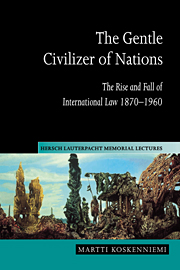Book contents
- Frontmatter
- Contents
- Preface
- List of abbreviations
- Introduction
- 1 “The legal conscience of the civilized world”
- 2 Sovereignty: a gift of civilization: international lawyers and imperialism, 1870–1914
- 3 International law as philosophy: Germany 1871–1933
- 4 International law as sociology: French “solidarism” 1871–1950
- 5 Lauterpacht: the Victorian tradition in international law
- 6 Out of Europe: Carl Schmitt, Hans Morgenthau, and the turn to “international relations”
- Epilogue
- Bibliography
- Index
6 - Out of Europe: Carl Schmitt, Hans Morgenthau, and the turn to “international relations”
Published online by Cambridge University Press: 06 July 2009
- Frontmatter
- Contents
- Preface
- List of abbreviations
- Introduction
- 1 “The legal conscience of the civilized world”
- 2 Sovereignty: a gift of civilization: international lawyers and imperialism, 1870–1914
- 3 International law as philosophy: Germany 1871–1933
- 4 International law as sociology: French “solidarism” 1871–1950
- 5 Lauterpacht: the Victorian tradition in international law
- 6 Out of Europe: Carl Schmitt, Hans Morgenthau, and the turn to “international relations”
- Epilogue
- Bibliography
- Index
Summary
On April 28, 1965 President Lyndon B. Johnson disclosed that 400 US marines had landed in the Dominican Republic “to give protection to the hundreds of Americans who are still in the Dominican republic and to escort them back to the country.” In a few days with the ostensible support of the Organization of American States (OAS) the evacuation turned into a large-scale invasion by more than 20,000 troops to prevent an elected leftist government from taking power. In May President Johnson justified the operation by the need to “prevent the emergence of another Cuba in the Western hemisphere.” As he later remarked, “the danger of a Communist take-over in the Dominican republic was a real and present one … a communist regime in the Dominican republic would be dangerous to the peace and security of the hemisphere and the United States.” In connection with the Cuban situation, the United States had already earlier been able to persuade the OAS that the adherence of any of its members to “Marxism–Leninism” would trigger the right of self-defense, interpreting “communism” as equivalent to “armed attack” under Art. 51 of the UN Charter. As the marines were landing in the Dominican Republic, the Legal Adviser of the State Department, L. C. Meeker, asserted a general right to use military force by the United States in the Western hemisphere against “foreign ideologies.”
- Type
- Chapter
- Information
- The Gentle Civilizer of NationsThe Rise and Fall of International Law 1870–1960, pp. 413 - 509Publisher: Cambridge University PressPrint publication year: 2001
- 1
- Cited by

